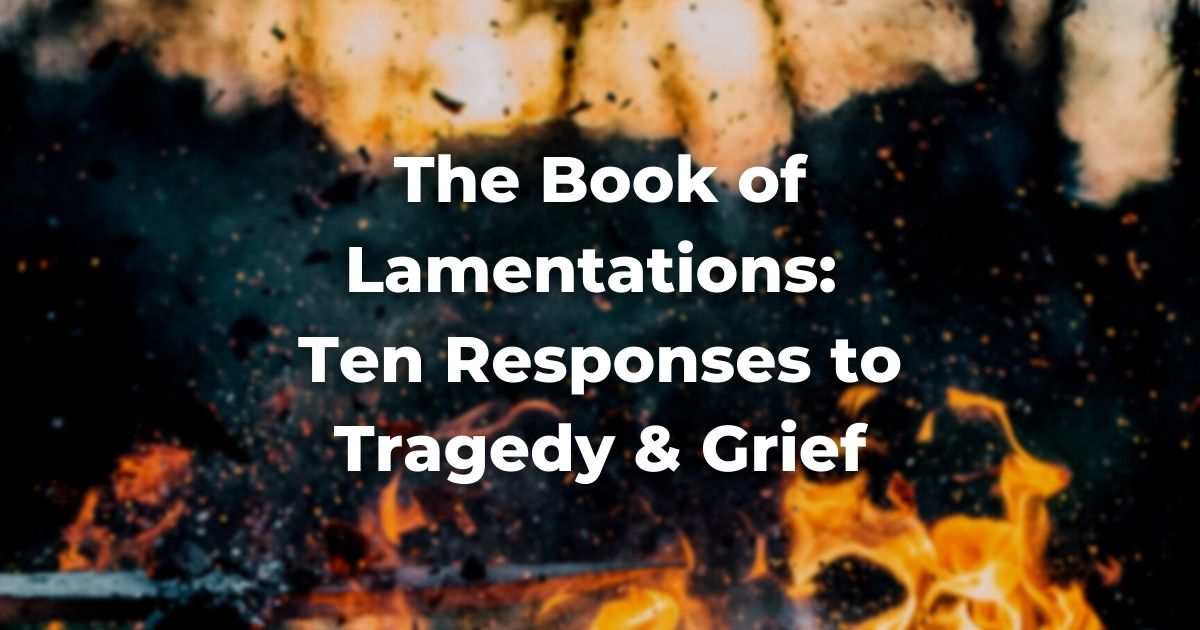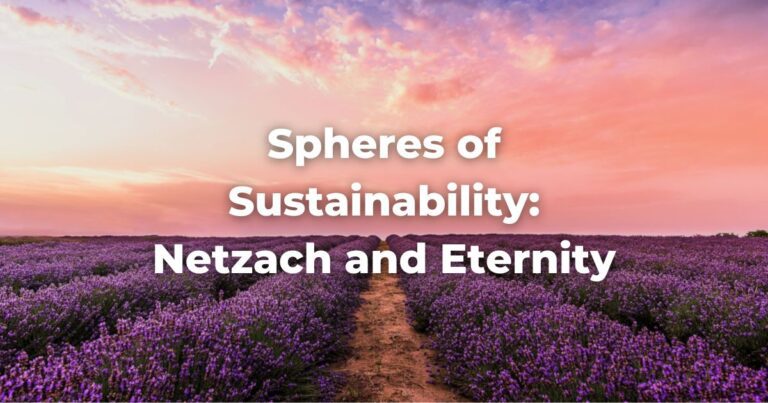Our primary text for Tishah B’Av is the biblical book of Lamentations.
The book contains five poems (one chapter each), each written by different anonymous authors in the aftermath of the destruction of the Jerusalem Temple and the subsequent exile in 586 BCE by the Babylonians.
Yet we read it every year as a prism through which to view all Jewish tragedies, particularly those commemorated on Tishah B’Av.
Yet Tishah B’Av is not entirely in the past: memory, tragedy, and grief continue.
Meanwhile, the slate of liturgical poems recited on Tishah B’Av is already so full that many events that occurred on Tishah B’Av have yet to be written and included.
Moreover, the problem of hate and the violence it engenders, particularly antisemitism, is still prevalent, rendering Tishah B’Av much more than a day of commemoration of historic events.
It now takes on urgency for understanding today’s climate, for thoughtful approaches on how to work with allies to eradicate hate, and what thoughtful actions we can take to better shape the world into one where senseless love, justice, and peace reign.
For now, however, let’s better understand our reactions to communal tragedies.
Everyone responds to and processes tragedy and grief differently; there is no one right way. Yet it may be healthful to become more aware of how we ourselves and others process our people’s ongoing project of recalling and transforming loss and grief.
Below is a chart of 10 specific responses to communal tragic loss and grief that the book of Lamentations holds up for us. Take your time reading through these. Afterward, reflect on and/or discuss the following:
-
- Which of these emotional/spiritual responses to communal tragedy do you most associate with the historic tragedies associated with Tishah B’Av? Are there responses here that you do not associate with Tishah B’Av? Please elaborate on your initial reactions.
- Are there emotional or spiritual responses that are not listed here that you associate with the communal tragedies associated with Tishah B’Av?
- When the Shoah (Holocaust) is mentioned, which are the responses that predominate for you? Which do you not usually feel?
- How do you react when you hear of an act of terrorism against the State of Israel when Israelis are killed? On which responses do you tend to focus? Which tends not to come up for you?
- With which of these did you respond on hearing of and processing antisemitic acts here in the U.S., such as the massacre at the Tree of Life Synagogue in Pittsburgh?
Quite often in understanding ancient material, it’s important to notice what’s in the middle, what’s at the core. In Lamentations, the response is “hope.”
-
- While we all zig and zag when working through an array of emotions, how easily do you get to a place of comfort and hope? If you get there too easily, might you be repressing or otherwise bypassing some of these other responses? If it takes you a long time to get to a place of hopefulness, might you be lingering too long on one of these responses?
- Some people worry that a focus on Jewish tragedies (past and present) might prevent us from empathizing, or even appropriately sympathizing, with other groups who have suffered from and through hate historically and currently (e.g. the African American community [and other POC], the LGBTQ+ community). How might we forge a “both/and” approach to such concerns?
Of course, Tishah B’Av can be an important vehicle for all of us to check up on where we are in managing our own feelings about our people’s history of tragedy and grief and their resilience, as well as our concerns and feelings about antisemitism today.
Let’s hope that this year’s reading of Lamentations and this year’s Tishah B’Av observance lead us all into a place of comfort with our tragedy and grief, hope for our future, and resolve to reshape the world into one more worthy of a G!d of love, a G!d of peace.
Kein y’hi ratzon! So may it be.
Responses to Tragedy and Grief in the Book of Lamentations
| Example | Response | English | Hebrew |
| Lam. 1:16 | Loneliness | For these things do I weep; my eyes flow with tears: Far from me is any comforter who might revive my spirit. My children are forlorn, for the foe has prevailed. |
עַל־אֵ֣לֶּה ׀ אֲנִ֣י בוֹכִיָּ֗ה עֵינִ֤י ׀ עֵינִי֙ יֹ֣רְדָה מַּ֔יִם כִּֽי־רָחַ֥ק מִמֶּ֛נִּי מְנַחֵ֖ם מֵשִׁ֣יב נַפְשִׁ֑י הָי֤וּ בָנַי֙ שֽׁוֹמֵמִ֔יםכִּ֥י גָבַ֖ר אוֹיֵֽב׃ |
| Lam. 1:18 | Regret | HaShem is in the right, for I have rebelled. Hear, all you peoples, and behold my agony: Young women and men have gone into captivity! |
צַדִּ֥יק ה֛וּא ה׳ כִּ֣י פִ֣יהוּ מָרִ֑יתִישִׁמְעוּ־נָ֣א כָל־הָֽעַמִּ֗ים וּרְאוּ֙ מַכְאֹבִ֔י בְּתוּלֹתַ֥י וּבַחוּרַ֖י הָלְכ֥וּ בַשֶּֽׁבִי׃ |
| Lam. 2:11 | Sadness | My eyes are spent with tears; my stomach churns. My bile is poured on the ground over the ruin of my poor people, while infants and babes languish in the squares of the city. |
כָּל֨וּ בַדְּמָע֤וֹת עֵינַי֙ חֳמַרְמְר֣וּ מֵעַ֔י נִשְׁפַּ֤ךְ לָאָ֙רֶץ֙ כְּבֵדִ֔י עַל־שֶׁ֖בֶר בַּת־עַמִּ֑י בֵּֽעָטֵ֤ף עוֹלֵל֙ וְיוֹנֵ֔ק בִּרְחֹב֖וֹת קִרְיָֽה׃ |
| Lam. 2:20 | Rage | Look, HaShem, and behold, to whom You have done this: Women eat their own fruit, their new-born babes! Priest and prophet are slain in Your Temple! |
רְאֵ֤ה ה׳ וְֽהַבִּ֔יטָה לְמִ֖י עוֹלַ֣לְתָּ כֹּ֑ה אִם־תֹּאכַ֨לְנָה נָשִׁ֤ים פִּרְיָם֙ עֹלְלֵ֣י טִפֻּחִ֔ים אִם־יֵהָרֵ֛ג בְּמִקְדַּ֥שׁ אֲדֹנָ֖י כֹּהֵ֥ן וְנָבִֽיא׃ |
| Lam. 3:16-18 | Despair | That One has ground my teeth on gravel; has pressed me into the dust. My life was bereft of peace, I have forgotten what goodness is. I thought my strength and hope had perished before HaShem. |
וַיַּגְרֵ֤ס בֶּֽחָצָץ֙ שִׁנָּ֔י הִכְפִּישַׁ֖נִי בָּאֵֽפֶר׃ וַתִּזְנַ֧ח מִשָּׁל֛וֹם נַפְשִׁ֖י נָשִׁ֥יתִי טוֹבָֽה׃ וָאֹמַר֙ אָבַ֣ד נִצְחִ֔י וְתוֹחַלְתִּ֖י מֵיְהֹוָֽה׃ |
| Lam. 3:22-24 | Hope | HaShem’s kindnesses have not ceased; G!d’s mercies are not spent. They are renewed every morning—massive is Your faithfulness! I say with full heart, “HaShem is my portion.” I yet place hope with G!d. |
חַֽסְדֵ֤י ה׳ כִּ֣י לֹא־תָ֔מְנוּ כִּ֥י לֹא־כָל֖וּ רַחֲמָֽיו׃ חֲדָשִׁים֙ לַבְּקָרִ֔ים רַבָּ֖ה אֱמוּנָתֶֽךָ׃ חֶלְקִ֤י ה׳ אָמְרָ֣ה נַפְשִׁ֔י עַל־כֵּ֖ן אוֹחִ֥יל לֽוֹ׃ |
| Lam. 3:37-42 | Guilt | Whose decree was ever fulfilled, unless HaShem willed it? Is it not at the word of the Most High that weal and woe befall? Shall the living complain, each of their own sins?!?! Let us search and examine our ways, and return to HaShem; Let us lift up our hearts with our hands to G!d in heaven: We have transgressed and rebelled, and You have not forgiven. |
מִ֣י זֶ֤ה אָמַר֙ וַתֶּ֔הִי אֲדֹנָ֖י לֹ֥א צִוָּֽה׃ מִפִּ֤י עֶלְיוֹן֙ לֹ֣א תֵצֵ֔א הָרָע֖וֹת וְהַטּֽוֹב׃ מַה־יִּתְאוֹנֵן֙ אָדָ֣ם חָ֔י גֶּ֖בֶר עַל־ חֲטָאָֽו׃ נַחְפְּשָׂ֤ה דְרָכֵ֙ינוּ֙ וְֽנַחְקֹ֔רָה וְנָשׁ֖וּבָה עַד־ה׳׃ נִשָּׂ֤א לְבָבֵ֙נוּ֙ אֶל־כַּפָּ֔יִם אֶל־אֵ֖ל בַּשָּׁמָֽיִם׃ נַ֤חְנוּ פָשַׁ֙עְנוּ֙ וּמָרִ֔ינוּ אַתָּ֖ה לֹ֥א סָלָֽחְתָּ׃ |
| Lam. 3:64-66 | Vengefulness | Give them, HaShem, their desserts according to their deeds. Give them anguish of heart; Your curse be upon them! Pursue them in wrath and destroy them from under Your heavens! |
תָּשִׁ֨יב לָהֶ֥ם גְּמ֛וּל ה׳ כְּמַעֲשֵׂ֥ה יְדֵיהֶֽם׃ תִּתֵּ֤ן לָהֶם֙ מְגִנַּת־לֵ֔ב תַּאֲלָֽתְךָ֖ לָהֶֽם׃ תִּרְדֹּ֤ף בְּאַף֙ וְתַשְׁמִידֵ֔ם מִתַּ֖חַת שְׁמֵ֥י ה׳׃ |
| Lam. 5:7 | Blaming | Our ancestors sinned and are no more; and we bear the consequences. |
אֲבֹתֵ֤ינוּ חָֽטְאוּ֙ וְאֵינָ֔ם וַאֲנַ֖חְנוּ עֲוֹנֹתֵיהֶ֥ם סָבָֽלְנוּ׃ |
| Lam. 5:21 | Pleading | Take us back, HaShem, to Yourself, and let us return; renew our days as of old! |
הֲשִׁיבֵ֨נוּ ה׳ ׀ אֵלֶ֙יךָ֙ וְֽנָשׁ֔וּבָה חַדֵּ֥שׁ יָמֵ֖ינוּ כְּקֶֽדֶם׃ |
Author
-

Rabbi Dr. J.B. Sacks (he/him) is the spiritual leader of Congregation Beth Shalom (Palm Desert, California). The first openly LGBTQ+ rabbi in the Conservative Movement, Rabbi Sacks is an advocate for inclusion in Jewish life and social justice. His most recent publication is Psalms in the Key of Healing. Rabbi Sacks is the eighteenth generation of rabbis on his mother’s side and lives with his husband Steven Karash in Palm Desert, California. They have an adult son, Evan.
View all posts






